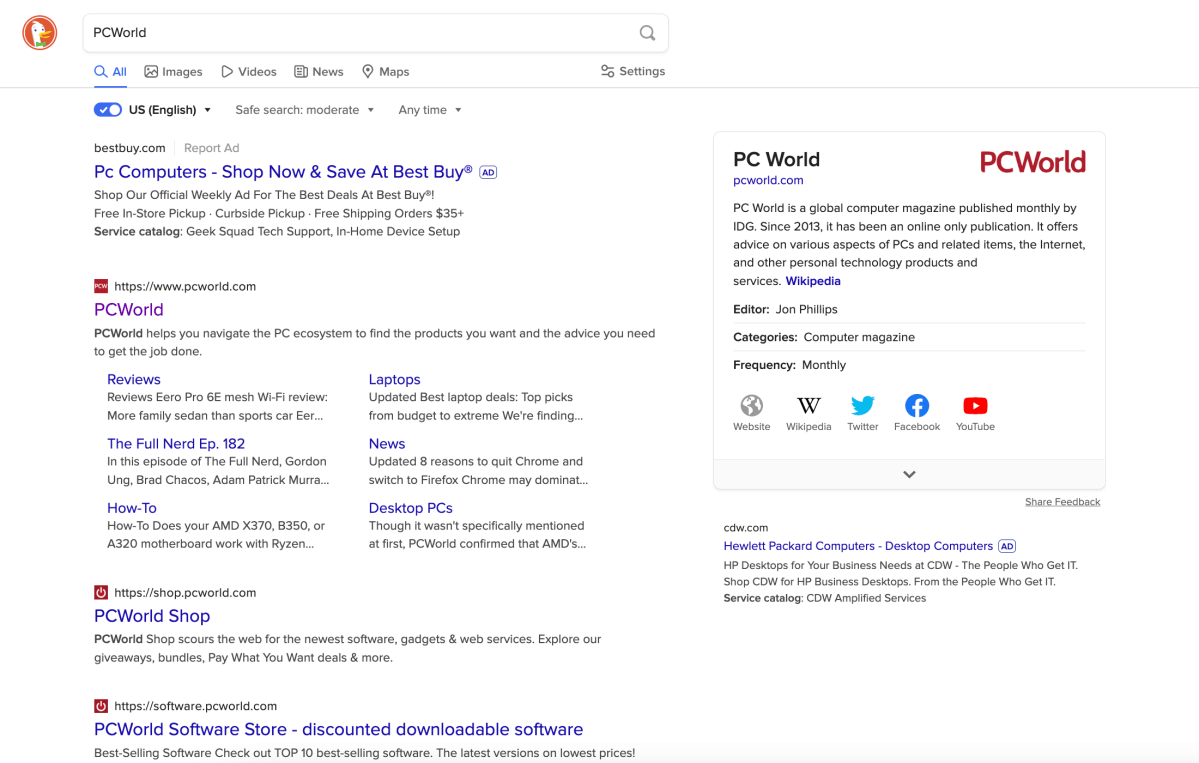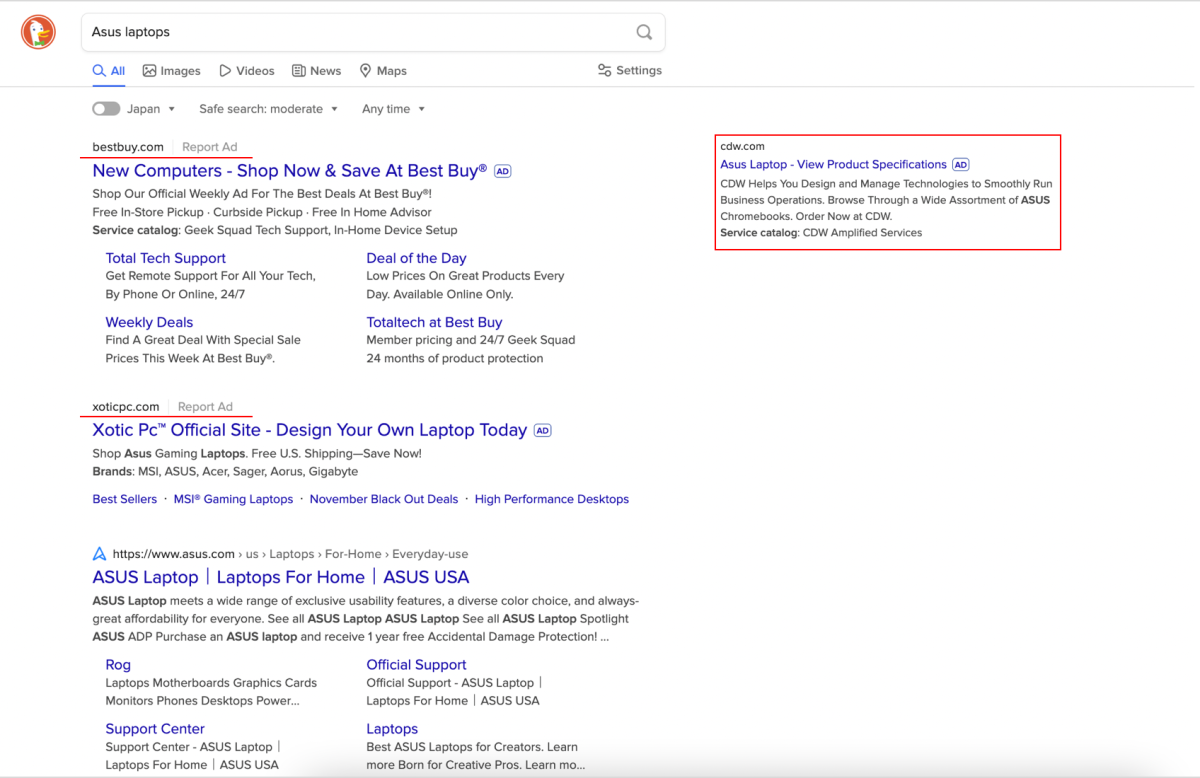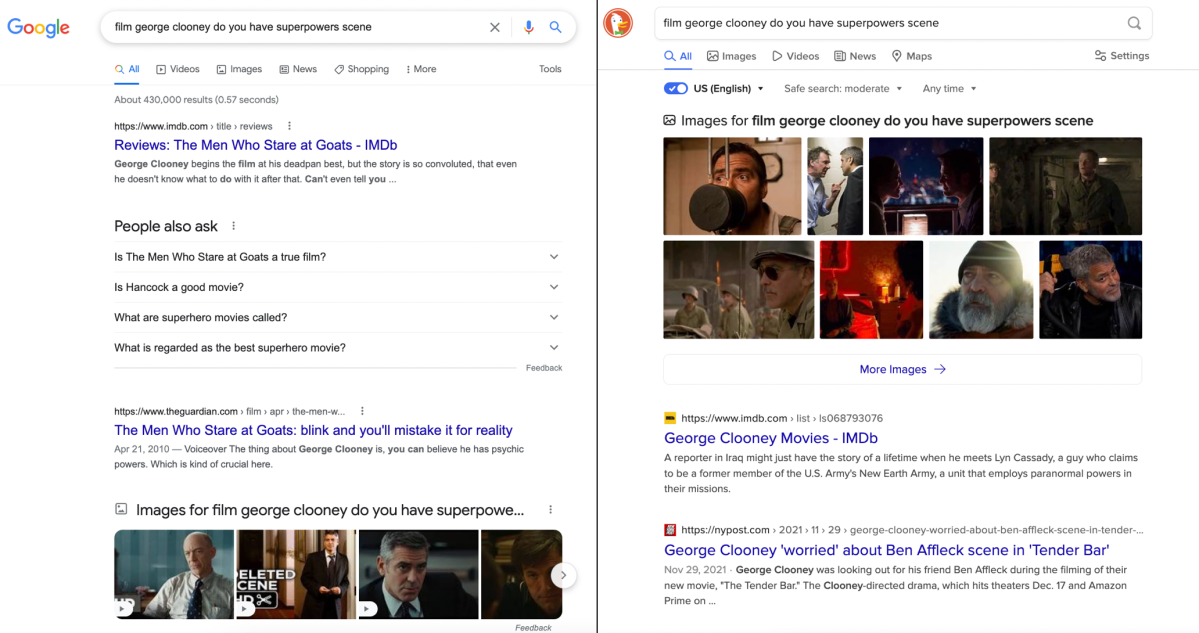Google is far and away the most popular search engine—but sometimes it can feel more like Big Brother and less like a friendly assistant. Indeed, for those concerned about privacy, Google oversteps some boundaries by collecting your personal data, and serving you ads based on what it collects. Enter DuckDuckGo, a privacy-focused search engine with its own desktop extension and mobile browser app.
DuckDuckGo touts itself as the anti-Google, promising not to track or collect your data. It offers a clean interface and familiar layout, and provides many of the features you’ve come to expect from a search engine—but without those invasive data trackers. (If privacy is a concern of yours, also consider switching from Google Chrome to Firefox.)
On paper, DuckDuckGo seems like a worthy competitor. But how does it really stack up to Google? To find out, I switched to DuckDuckGo and used the service exclusively for a week. Here are my five key takeaways.
1. DuckDuckGo is refreshing
DuckDuckGo’s privacy features surprised me with how liberating they feel. The service insists that it doesn’t collect user data or track you across different websites. It also doesn’t associate your browsing with your IP address, and won’t save your search history.
For someone who has used Google most of his adult life, this feels oddly refreshing. I barely remember a time when my every move wasn’t tracked, analyzed, and then marketed back to me through targeted suggestions and ads.
Using DuckDuckGo brought me back to a simpler time when a search engine was only there to answer questions like, “What is the best laptop under $1000?” or “What was Tim Robbins’ character’s nickname in Top Gun?” (It was Merlin.)
Privacy is the biggest draw of DuckDuckGo, and it applies it in a way that doesn’t feel restricting. The entire time I was using the search engine, I didn’t feel inconvenienced by the lack of personalization. Unlike Google, DuckDuckGo won’t auto-suggest new searches because it doesn’t collect your search history, but this felt like a small price to pay for more private browsing.
Another refreshing privacy feature: DuckDuckGo actively blocks external trackers from following you around online. So, not only does the service itself keep your browsing private, it also prevents third parties from tracking you as well.
2. DuckDuckGo has a good UI
Before I started using DuckDuckGo, I had this image of a bare-bones search engine, a la early 2000s Google. It proved me wrong. Very wrong. The DuckDuckGo designers have put a lot of thought into usability, and it shows. The interface is aesthetically pleasing with a clean and simple layout that doesn’t try to reinvent the wheel.

DuckDuckGo’s UI is clean, minimal, and familiar.
Sam Singleton
Make no mistake, DuckDuckGo has a similar feel to Google (but then again, so do all modern search engines). Elements such as ad placements and knowledge panels are ripped straight from Google. This isn’t necessarily a knock on DuckDuckGo, however. The engine’s “if it ain’t broke, don’t fix it” approach to design works perfectly well.
They’ve even cleaned it up a bit and added some welcome changes. For instance, DuckDuckGo doesn’t split results across pages. Rather, when you reach the bottom of a page, you can just click “See more results” in an endless scroll. This is a minor tweak, but it felt better than clicking back and forth through pages and pages.
3. Yes, you can escape from ads
This kind of goes along with the first point on this list: Since DuckDuckGo doesn’t track your browsing history, it cannot provide you with targeted personalized ads.
As you use its services, Google creates a profile on you based on personal data, such as your search habits and purchasing history. This data is then applied to ad targeting, leading to highly specific ads popping up on seemingly every website you visit. For example, when I searched Google for stuffed toys to buy for my young nephew’s birthday, every website I visited for the next few weeks kept showing me Pokemon plushies in their banner advertisements.
But I had none of these same advertisement hauntings while using DuckDuckGo. When I searched for something, the results page would show only a few related advertisements along the right-hand side, or above the first results. These ads were only relevant to what I was searching, and never followed me around while browsing other websites. In fact, while using DuckDuckGo, I noticed fewer advertisements in general. In a day and age when we’re constantly bombarded with flashing ads and pop-ups, this made for a really pleasant browsing experience.

Ads along the top and right side can be seen after a search (highlighted in red to make my point).
Sam Singleton
4. You’ll trade some search smarts for privacy
Google is great for finding things I just can’t quite remember. I enter a few random facts that I do remember, and it will usually will give me the answer. When I tried these same types of searches with DuckDuckGo, it just didn’t have the algorithms (or data?) to deliver.
In the screenshot below, you can see that I was looking for the name of a movie (Men Who Stare at Goats) based on a random scene. Since I didn’t know the movie’s name, I instead searched using “film george clooney do you have superpowers scene”. Google returned the movie I was looking for on the first result, while DuckDuckGo simply couldn’t find it. Now this is a rather specific example, but users have come to rely on Google delivering great results with sparse inputs.

Google shows it on the first hit. DuckDuckGo, not so much.
Sam Singleton
Of course, one of the main reasons Google is so effective is that it collects and stores user data, and then tailors it for personalization. Without tapping into a massive library of contextual data, DuckDuckGo will continue to fall behind Google in returned result accuracy.
5. I really miss Google maps
After exclusively using DuckDuckGo for a week, I can say that I officially miss the way Google search seamlessly hooks into Google maps. Sure, DuckDuckGo has a maps feature provided by Apple, but it isn’t the same. Just like when I’m using an iPhone, I prefer to use Google Maps rather than the pre-installed Apple Maps. It just feels better in terms of the available data and its reliability.

The Google ecosystem offers a wide variety of features.
Sam Singleton
Something else I missed is direct access to the entire Google ecosystem. Both in my personal and professional life, I have come to rely on Google apps such as Drive and Google Workspaces. Google has done a great job connecting all of their features seamlessly together. Not being able to integrate these with my search engine experience felt like I was missing a piece of the puzzle.
Will I switch to DuckDuckGo permanently? Should you?
Should you switch to DuckDuckGo? It depends on what you want from your search engine. Do you value privacy above all else? Then go ahead and make the switch. Do you want the most accurate results and most advanced features? Then you’ll want to stick with Google.
As for me, I plan to continue using DuckDuckGo. I’m a jaded millennial and I grew up in the age of internet data tracking. I had long ago accepted that my privacy would be sacrificed for more accurate results. But what I found from this little experiment was that, for the most part, what we’re all searching for online is pretty simple and straightforward.
While Google is able to accurately guess what you’re looking for, a bit more hand-holding is required with DuckDuckGo. This doesn’t mean that DuckDuckGo can’t find what you’re after. It just means that you may have to modify your search parameters. The streamlined Google web browsing I’ve become accustomed to via cookies, auto-fill, and personalization are of course a convenience. But without these bells and whistles, the results are largely the same.
And I figure, if the results are the same, why not err on the side of privacy?
https://www.pcworld.com/article/708188/switch-from-google-to-duckduckgo-private-search.html
Login to add comment
Other posts in this group

An Australian company called Cortical Labs has developed a computer p


AMD loves to build to a crescendo. As it’s shown since 2016, when its


Having a way to charge your devices while on the go is essential thes

As a fully remote worker, I love being able to take my work laptop to

If you have multiple monitors on your desk, you know how much space t
